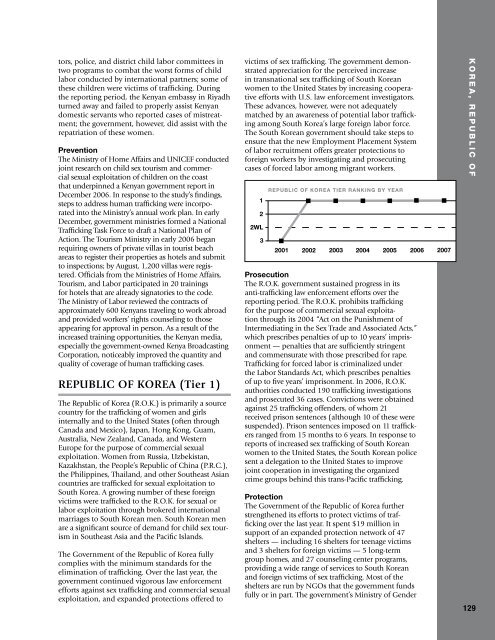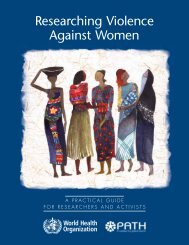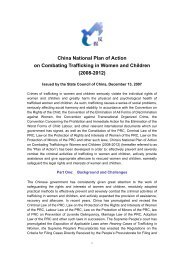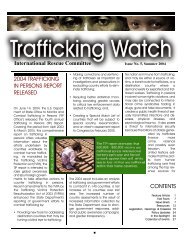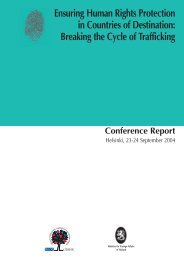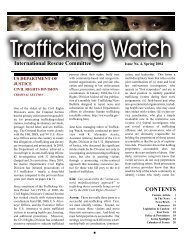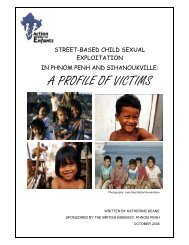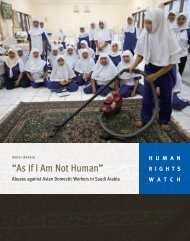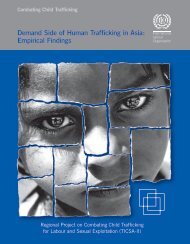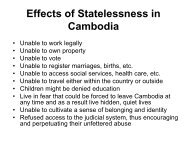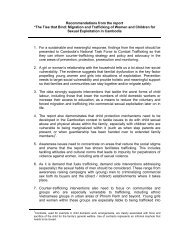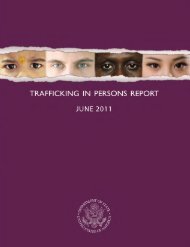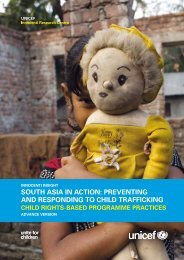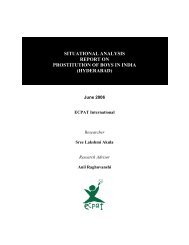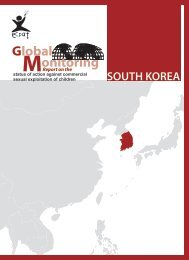2007 Trafficking in Persons Report - Center for Women Policy Studies
2007 Trafficking in Persons Report - Center for Women Policy Studies
2007 Trafficking in Persons Report - Center for Women Policy Studies
You also want an ePaper? Increase the reach of your titles
YUMPU automatically turns print PDFs into web optimized ePapers that Google loves.
tors, police, and district child labor committees <strong>in</strong><br />
two programs to combat the worst <strong>for</strong>ms of child<br />
labor conducted by <strong>in</strong>ternational partners; some of<br />
these children were victims of traffick<strong>in</strong>g. Dur<strong>in</strong>g<br />
the report<strong>in</strong>g period, the Kenyan embassy <strong>in</strong> Riyadh<br />
turned away and failed to properly assist Kenyan<br />
domestic servants who reported cases of mistreatment;<br />
the government, however, did assist with the<br />
repatriation of these women.<br />
Prevention<br />
The M<strong>in</strong>istry of Home Affairs and UNICEF conducted<br />
jo<strong>in</strong>t research on child sex tourism and commercial<br />
sexual exploitation of children on the coast<br />
that underp<strong>in</strong>ned a Kenyan government report <strong>in</strong><br />
December 2006. In response to the study’s f<strong>in</strong>d<strong>in</strong>gs,<br />
steps to address human traffick<strong>in</strong>g were <strong>in</strong>corporated<br />
<strong>in</strong>to the M<strong>in</strong>istry’s annual work plan. In early<br />
December, government m<strong>in</strong>istries <strong>for</strong>med a National<br />
<strong>Traffick<strong>in</strong>g</strong> Task Force to draft a National Plan of<br />
Action. The Tourism M<strong>in</strong>istry <strong>in</strong> early 2006 began<br />
requir<strong>in</strong>g owners of private villas <strong>in</strong> tourist beach<br />
areas to register their properties as hotels and submit<br />
to <strong>in</strong>spections; by August, 1,200 villas were registered.<br />
Officials from the M<strong>in</strong>istries of Home Affairs,<br />
Tourism, and Labor participated <strong>in</strong> 20 tra<strong>in</strong><strong>in</strong>gs<br />
<strong>for</strong> hotels that are already signatories to the code.<br />
The M<strong>in</strong>istry of Labor reviewed the contracts of<br />
approximately 600 Kenyans travel<strong>in</strong>g to work abroad<br />
and provided workers’ rights counsel<strong>in</strong>g to those<br />
appear<strong>in</strong>g <strong>for</strong> approval <strong>in</strong> person. As a result of the<br />
<strong>in</strong>creased tra<strong>in</strong><strong>in</strong>g opportunities, the Kenyan media,<br />
especially the government-owned Kenya Broadcast<strong>in</strong>g<br />
Corporation, noticeably improved the quantity and<br />
quality of coverage of human traffick<strong>in</strong>g cases.<br />
REPUBLIC OF KOREA (Tier 1)<br />
The Republic of Korea (R.O.K.) is primarily a source<br />
country <strong>for</strong> the traffick<strong>in</strong>g of women and girls<br />
<strong>in</strong>ternally and to the United States (often through<br />
Canada and Mexico), Japan, Hong Kong, Guam,<br />
Australia, New Zealand, Canada, and Western<br />
Europe <strong>for</strong> the purpose of commercial sexual<br />
exploitation. <strong>Women</strong> from Russia, Uzbekistan,<br />
Kazakhstan, the People’s Republic of Ch<strong>in</strong>a (P.R.C.),<br />
the Philipp<strong>in</strong>es, Thailand, and other Southeast Asian<br />
countries are trafficked <strong>for</strong> sexual exploitation to<br />
South Korea. A grow<strong>in</strong>g number of these <strong>for</strong>eign<br />
victims were trafficked to the R.O.K. <strong>for</strong> sexual or<br />
labor exploitation through brokered <strong>in</strong>ternational<br />
marriages to South Korean men. South Korean men<br />
are a significant source of demand <strong>for</strong> child sex tourism<br />
<strong>in</strong> Southeast Asia and the Pacific Islands.<br />
The Government of the Republic of Korea fully<br />
complies with the m<strong>in</strong>imum standards <strong>for</strong> the<br />
elim<strong>in</strong>ation of traffick<strong>in</strong>g. Over the last year, the<br />
government cont<strong>in</strong>ued vigorous law en<strong>for</strong>cement<br />
ef<strong>for</strong>ts aga<strong>in</strong>st sex traffick<strong>in</strong>g and commercial sexual<br />
exploitation, and expanded protections offered to<br />
victims of sex traffick<strong>in</strong>g. The government demonstrated<br />
appreciation <strong>for</strong> the perceived <strong>in</strong>crease<br />
<strong>in</strong> transnational sex traffick<strong>in</strong>g of South Korean<br />
women to the United States by <strong>in</strong>creas<strong>in</strong>g cooperative<br />
ef<strong>for</strong>ts with U.S. law en<strong>for</strong>cement <strong>in</strong>vestigators.<br />
These advances, however, were not adequately<br />
matched by an awareness of potential labor traffick<strong>in</strong>g<br />
among South Korea’s large <strong>for</strong>eign labor <strong>for</strong>ce.<br />
The South Korean government should take steps to<br />
ensure that the new Employment Placement System<br />
of labor recruitment offers greater protections to<br />
<strong>for</strong>eign workers by <strong>in</strong>vestigat<strong>in</strong>g and prosecut<strong>in</strong>g<br />
cases of <strong>for</strong>ced labor among migrant workers.<br />
Prosecution<br />
The R.O.K. government susta<strong>in</strong>ed progress <strong>in</strong> its<br />
anti-traffick<strong>in</strong>g law en<strong>for</strong>cement ef<strong>for</strong>ts over the<br />
report<strong>in</strong>g period. The R.O.K. prohibits traffick<strong>in</strong>g<br />
<strong>for</strong> the purpose of commercial sexual exploitation<br />
through its 2004 “Act on the Punishment of<br />
Intermediat<strong>in</strong>g <strong>in</strong> the Sex Trade and Associated Acts,”<br />
which prescribes penalties of up to 10 years’ imprisonment<br />
— penalties that are sufficiently str<strong>in</strong>gent<br />
and commensurate with those prescribed <strong>for</strong> rape.<br />
<strong>Traffick<strong>in</strong>g</strong> <strong>for</strong> <strong>for</strong>ced labor is crim<strong>in</strong>alized under<br />
the Labor Standards Act, which prescribes penalties<br />
of up to five years’ imprisonment. In 2006, R.O.K.<br />
authorities conducted 190 traffick<strong>in</strong>g <strong>in</strong>vestigations<br />
and prosecuted 36 cases. Convictions were obta<strong>in</strong>ed<br />
aga<strong>in</strong>st 25 traffick<strong>in</strong>g offenders, of whom 21<br />
received prison sentences (although 10 of these were<br />
suspended). Prison sentences imposed on 11 traffickers<br />
ranged from 15 months to 6 years. In response to<br />
reports of <strong>in</strong>creased sex traffick<strong>in</strong>g of South Korean<br />
women to the United States, the South Korean police<br />
sent a delegation to the United States to improve<br />
jo<strong>in</strong>t cooperation <strong>in</strong> <strong>in</strong>vestigat<strong>in</strong>g the organized<br />
crime groups beh<strong>in</strong>d this trans-Pacific traffick<strong>in</strong>g.<br />
Protection<br />
The Government of the Republic of Korea further<br />
strengthened its ef<strong>for</strong>ts to protect victims of traffick<strong>in</strong>g<br />
over the last year. It spent $19 million <strong>in</strong><br />
support of an expanded protection network of 47<br />
shelters — <strong>in</strong>clud<strong>in</strong>g 16 shelters <strong>for</strong> teenage victims<br />
and 3 shelters <strong>for</strong> <strong>for</strong>eign victims — 5 long-term<br />
group homes, and 27 counsel<strong>in</strong>g center programs,<br />
provid<strong>in</strong>g a wide range of services to South Korean<br />
and <strong>for</strong>eign victims of sex traffick<strong>in</strong>g. Most of the<br />
shelters are run by NGOs that the government funds<br />
fully or <strong>in</strong> part. The government’s M<strong>in</strong>istry of Gender<br />
K O R E A , R E P U B L I C O F<br />
129


